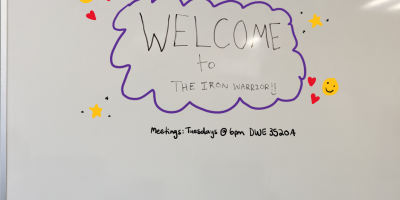Lo and behold, issue four is ready! This term is already nearly over, but we wont mention the inals-fay just yet. The second half of term should hopefully run a lot more smoothly than the first, as you find yourself surprisingly adjusted to the regime of having three assignments due in one day (maybe even, gasp, getting some assignments ahead of time? Is this real life?).
In this issue, we have several rather serious topics discussed, including the devastating attacks on Paris that we featured on the front page, as well as discussions regarding the abolishment of China’s one-child policy, the lives of social media stars, and the horrifying health effects that you never knew a tapeworm could have on you.
Alas, the seriousness continues in the columns as well, as Nina discusses the unfortunate malpractices of Tim Hortons and Starbucks in Leafy Thoughts, while Caitlin discusses some grotesque body modifications in Five Things You Really Don’t Want to Know.
But don’t worry, Donovan has a couple of more light hearted columns— I would particularly like to highlight this issue’s edition of From Page to Page, in which he discusses some of the greatest nemeses of everyone’s favourite web-slinging masked vigilante. Elizabeth brings the first news of the new hockey season in The Benchwarmer Report, and Ashlyn brings the inside scoop on Bob McKillop’s professional and personal life in Prof Personalities.
Again, I’d like to thank the wonderful Leah and Nina for their continued support during production weekend, as well as Caitlin for her first venture into the wonderful world of layout.
Now, for those of you who have been talking with me at all in the past eight months, you would have discovered my new passion for eSports— particularly, competitive Super Smash Bros. Yes, Super Smash Bros. That one game where you can make Link wield a beam sword against Mario and Donkey Kong atop mid-race a car from F-Zero.
Except, I mean competitive Smash, where we play with specific rules: a certain number of stocks, on only certain (so called “legal”) stages, for a given amount of time… and yes, no items. Sorry to break it to you, but Smash tournaments aren’t focused around which lucky player’s Pokéball had a Moltres inside it.
You’d be surprised at the size of the scene, if you aren’t looking for it— you can find smaller, more accessible tournaments almost anywhere, even here at the University of Waterloo, where we hold two tournaments a week for two different entries in the Smash games. Then, bigger events with even bigger prize pools are held less frequently, with some events attracting international competitors, such at the upcoming Genesis 3 in January.
This very weekend I myself will be travelling with a few others to Oshawa to represent the Kitchener-Waterloo region in a regional tournament, LANWAR X. There I will be entered in both the singles and doubles event— singles typically being the more popular of the two events, as they feature the typical mano-à-mano action and grudge matches of players, and whose competitive ‘meta-game’ is far more explored. Doubles, on the other hand, features a two-versus-two dynamic, where co-operation and synergy can matter more than individual player skill. My own partner is a music student studying a Laurier university— an interesting connection for someone I likely wouldn’t have met otherwise.
Bigger tournaments like this are incredibly fun events. Not only do you get to meet and reunite with players from different regions, such as Toronto, London, Ottawa, and even Montréal. Sometimes these players are even nationally or internationally famous… which, of course, will mean absolutely nothing to the common person, but can be quite exciting for someone like me to finally meet, talk to, and maybe even play some matches against some of the greatest players in the world.
Okay, so you might be laughing right now at the idea of a bunch of people— ranging in age typically from high school to post-grads, but typically in the 19 – 25 year old demographic— playing everyone’s favourite party game competitively, but you might be surprised at the level of technical and mental skills that you need in order to even hope of doing well at a tournament.
Of the four present entries in the Smash Bros. franchise (well, technically five, but that’s another story), the two most popular games right now are Melee, the second instalment, and Super Smash Bros. for WiiU and 3DS, the most recent instalment with a horribly long and awkward name that most people refer to as Smash 4, since it is indeed the fourth entry in the series (and doubles as somewhat of a snarky reference to the “for” in the official cumbersome title).
While Melee was originally released back in 2001, it is still to this day played and preferred by many in the competitive community due to its fast, complex, and highly technically driven gameplay. In the community, this translates to a large amount of “tech skill”— actions that are typically not intuitive and sometimes incredibly difficult to perform, but vastly improve your own gameplay.
Perhaps most impressive is that the majority of these so-called “techs” are actually fan-discovered exploits of glitches or the fundamental physics of Melee. For example, the technique known as “wavedashing”, a means of moving in which a character can slide forwards or backwards even while attacking which is now paramount at even the lowest of competitive play, takes advantage of the mix of physics that occurs when a character air-dodges into the ground. This means that the complicated and precise nature of high-level Melee play was something that the developers hadn’t even intended to be possible.
Smash 4, on the other hand, is criticized by some members of the community for having a far lower skill floor for competing (especially when compared to Melee). However, it has its own charms and unique gameplay elements that make it attractive for people to both play and watch competitively— including myself, as it is my game of choice.
My own adventures into the competitive Super Smash Bros. scene started during my previous work term. I spent about half of of my free time during eight months of the long Ottawa winter exploring the city and surrounding area, and the other half recovering from the time spent out in that bone-chilling cold. During this recovery time, I often found myself snuggled up beneath a blanket with a cup of coffee, tea, or hot chocolate, and my 3DS in hand playing some of the newest Smash game I had received as a Christmas present
Most often, I would play online with strangers or friends, but I became curious about ways that I could get better at the main character(s) that I played (known colloquially as “mains”). Online, I discovered resources aimed at doing just that on YouTube, Reddit, and particularly a forum dedicated towards improving at Smash on a competitive level, known as Smashboards. While I learned many details about the fundamental, technical, and mental skills needed in order to… hmm, shall we say… “git gud” at Smash, the biggest repeated advice that I saw from every source was the importance of attending offline tournaments.
Perhaps I could have taken advantage of my time in Ottawa better during my co-op, but lack of familiarity with the area (particularly the university-aged community) held me back from exploring the possibility of attending tournaments there (a decision I now regret). But once back in Waterloo for my 3A term, I heard about a tournament being held in Uptown Waterloo. I went, got my tail whooped, and made a few new friends, who told me about our weekly tournaments.
From then on, I’ve actually been decently involved in our local KW scene, and even made my way to a few bigger provincial tournaments (where I at least like to think I’ve been performing better as a player). I’ve fallen in love with this game— and with the feeling in competing in this game. for what I think is for good reason.
As I’ve mentioned before, there are both fundamental, technical, and mental skills that are required in order for anyone to succeed. These can include pure knowledge, such as the specifics of strength, speed, and mechanics of your character as well your opponent’s (considerations that are all factors into that particular “match-up”), as well as far more abstract matters, such as observing your opponent’s own offensive and defensive habits in order to essentially “read” their movements before they even happen— something which, if done correctly, can mean the difference between winning or losing.
If I had to akin the complexity of the metagame of Smash (and really, to many FGC-style competitive metagames) to anything, it’s to the strategy that exists in the different levels of baseball— yes, I’m going to akin this to another of my passions. It’s easier that way for me.
Just as you can pay attention to each pitch, each at-bat, and each game with respect to both the batters and pitcher in order to make adjustments over the season (or even multiple seasons) and developing particular batter-pitchers match-ups,’ a good Smash player will observe their opponent’s habits based on each move choice during each game and each set, in order to begin to develop match-ups against each other. Take, for example, how some overly aggressive players can be shut down by very defensive play styles, which in turn can be countered by a very bait-heavy play style.
On YouTube, there is a fantastic video by the channel Innuendo studios called “Things of Beauty: Super Smash Bros. as a Spectator Sport”, which I recommend heartily for its description and analysis into what I find most illustrious about the competitive game, as a player, spectator, and member of the community.
And, for those of you interested, I go by the tag “Paradigm” and main Shulk from the Xenoblade franchise, who is a low/mid “tier” character, meaning that he is not considered especially competitive to play at high level. However, I find him incredibly fun and interesting to use and will enjoy representing throughout my competitive Smash career.




Leave a Reply